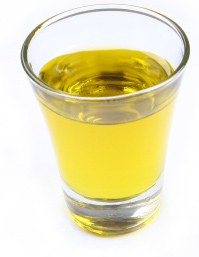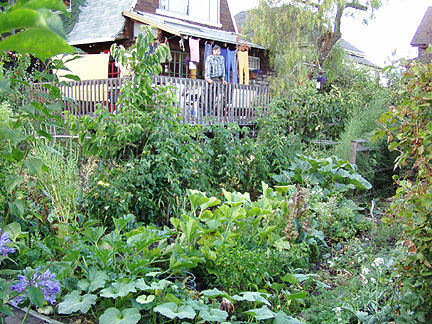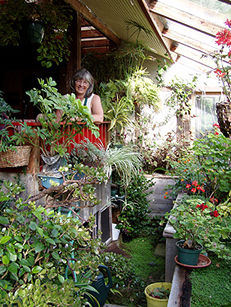
What is in urine?
 Since
we're considering using urine as a fertilizer, it makes sense to figure
out what's in that yellow liquid. The actual percentages of each
component can vary depending on what you eat, but pee from an average
Westerner has an NPK of 11-1-2.5. For those of you not familiar
with NPK, that's a fertilizer that's very high in nitrogen, low in
phosphorus, and moderate in potassium.
Since
we're considering using urine as a fertilizer, it makes sense to figure
out what's in that yellow liquid. The actual percentages of each
component can vary depending on what you eat, but pee from an average
Westerner has an NPK of 11-1-2.5. For those of you not familiar
with NPK, that's a fertilizer that's very high in nitrogen, low in
phosphorus, and moderate in potassium.
After water, the major
components in urine are high nitrogen chemicals
including urea, creatine, ammonia, and uric acid. Pee also
contains a significant amount of salt (sodium chloride), and a bit of
calcium, magnesium, and sulfur. Rarely will urine contain a few
disease-causing organisms --- primarily leptospirosis and schistosoma
in the tropics, and salmonella (which dies quickly in soil.)
Beyond the unbalanced
NPK (which can be fixed by mixing the urine with other
nutrient sources, like chicken manure to increase the phosphorus and
wood ashes to increase the potassium), the primary problem with using
urine as fertilizer
is salt. If you fertilize solely with urine, your soil may build
up salts to a level which harm the plants growing there, so Carol
Steinfeld recommends using urine as fertilizer only in regions with
regular rainfall to wash salt away. A high tech option consists
of buying a Total Dissolved Solids (TDS) meter from a hydroponics store
to monitor salt content of your urine, then diluting the urine down  to
1,700 ppm salt before using it as fertilizer. Alternatively, just
spread urine around a lot, never focusing on one part of the garden,
and salt buildup will probably be minimal. Finally, a
doctor-gardener profiled in Liquid
Gold
(and pictured here) took a more proactive approach --- he put himself
on a low-salt diet so
that his plants wouldn't be hindered by the salty urine.
to
1,700 ppm salt before using it as fertilizer. Alternatively, just
spread urine around a lot, never focusing on one part of the garden,
and salt buildup will probably be minimal. Finally, a
doctor-gardener profiled in Liquid
Gold
(and pictured here) took a more proactive approach --- he put himself
on a low-salt diet so
that his plants wouldn't be hindered by the salty urine.
I wasn't entirely
content with Carol Steinfeld's answers about salty
soil, so I did a little research of my own. Although extension
service and USDA websites don't talk about applying urine to your
plants, they do have answers for salt buildups from other
sources. Reading between the lines, I would suggest applying your
urine to salt-tolerant
crops
such as asparagus and zucchini, while steering clear of salt-haters
like beans, carrots, okra, onions, parsnips, peas, and
strawberries. Don't apply urine to waterlogged or high clay soil
since these soils will hold onto the salt no matter what you do ---
sounds like we should keep our urine out of the badly-drained back
garden. If you're concerned that  you've overdone it, you could
send your soil in to be tested by the experts, or you can follow the Colorado
State University Extension's
lead and use bean plants as biological indicators: "Bean plants are
rather salt sensitive and can be used to help assess
salt problems. In a garden, if beans are doing well, soluble
salts are
not a problem." The cure for salty soil is adding lots of water
(6 to 24 inches in a slow, continuous stream) to leach the salts out.
you've overdone it, you could
send your soil in to be tested by the experts, or you can follow the Colorado
State University Extension's
lead and use bean plants as biological indicators: "Bean plants are
rather salt sensitive and can be used to help assess
salt problems. In a garden, if beans are doing well, soluble
salts are
not a problem." The cure for salty soil is adding lots of water
(6 to 24 inches in a slow, continuous stream) to leach the salts out.
As long as you
understand how to prevent salt buildup in the soil, it sounds like
urine is a great fertilizer. Liquid Gold's website
includes some beautiful pictures from gardeners who fertilize with
urine, and we're keen to work the kinks out of applying urine to our
own farm. Stay tuned for tomorrow's post about the nitty-gritty
of
urine fertilizing.
| This post is part of our Urine Fertilizer lunchtime series.
Read all of the entries: |
Want more in-depth information? Browse through our books.
Or explore more posts by date or by subject.
About us: Anna Hess and Mark Hamilton spent over a decade living self-sufficiently in the mountains of Virginia before moving north to start over from scratch in the foothills of Ohio. They've experimented with permaculture, no-till gardening, trailersteading, home-based microbusinesses and much more, writing about their adventures in both blogs and books.
Want to be notified when new comments are posted on this page? Click on the RSS button after you add a comment to subscribe to the comment feed, or simply check the box beside "email replies to me" while writing your comment.

Given the amount of space you have, and the amount of urine that two people can produce, will salt ever really be a problem?
How much urine would you have to apply per square foot (or whatever) to cause a problem?
Seeing how well salt dissolves in water and given the fact the osmotic pressure will tend to spread out the salt through the water table, I think you'd need a lot.
Along the Dutch coast infiltration of seawater is a problem due to the low water levels in our reclaimed land. But there is a lot of salt in seawater.
As an experiment, take a glass of water and add salt until no more salt will dissolve. Now take a small sip to get an impression of how much salt that really is... I can guarantee you that you'll spit it out immediately! (You'll want to rinse your mouth with fresh water afterwards)
How much salt will accumulate will depend a lot on drainage of the land, permeability of the soil, rain, sunshine etc.
There must be something weird about my interests, when the topic of using human urine as fertiliser comes up twice in one day in my RSS feeds!
http://thecontraryfarmer.wordpress.com/2011/01/19/human-manure-shops-are-a-hot-business-in-north-korea/
Roland --- I knew I could count on you to chime in. I think that plants can probably "taste" salt at a much lower percentage than the one you've mentioned, though. What I don't know is what percent salt will harm plants --- I guess that would be where to start my research, huh?
I think that plants can probably "taste" salt at a much lower percentage than the one you've mentioned, though. What I don't know is what percent salt will harm plants --- I guess that would be where to start my research, huh?
Sheila --- I stole that photo off the internet, and I think it actually is probably food coloring. I agree that healthy urine shouldn't look nearly that yellow. The internet says that yellow urine is caused by urobilins, which is a broken down product of bilirubin, which in turn is a broken down product of used up hemoglobin.
Darren --- What's weird about urine as fertilizer? (I've got Gene Logsdon on my RSS feed --- I'll have to go see what he has to say today.)
(I've got Gene Logsdon on my RSS feed --- I'll have to go see what he has to say today.)
Dawn --- Even if you're well hydrated and healthy, I don't think your urine would ever be completely clear --- just a lot paler.
I don't know much about alcohol, but my vague understanding is that it tends to dehydrate you. That would make your urine much yellower, as you mention.
I haven't personally looked into every possible illness, but there have been lots of scientific studies of using urine on food-growinggardens, especially in places like Sweden where they do it on a large scale. The idea is that diseases that survive well in our bodies can't live in the completely different conditions of the soil. Beneficial soil microorganisms outcompete them very quickly. So, if you use urine on your tomato plants, then wait at least a week, any pathogens are going to be long gone.
Here is what some Finnish people think is found in urine: https://www.frontiersin.org/articles/10.3389/fsufs.2018.00032/full Sounds quite promising as fertilizer.